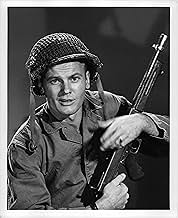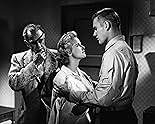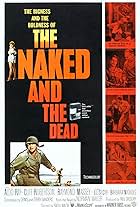IMDb RATING
6.4/10
2.7K
YOUR RATING
Young Marines have adventures in love and war.Young Marines have adventures in love and war.Young Marines have adventures in love and war.
- Nominated for 1 Oscar
- 1 nomination total
L.Q. Jones
- Pvt. L.Q. Jones
- (as Justus E. McQueen)
Featured reviews
My rating of Battle Cry has more to do with my disappointment with the plot than the actually quality of the movie. I knew nothing of the movie before I watched it, but with a name like Battle Cry, I was expecting a war movie along the lines of Battleground (with which it is paired in the double feature DVD I bought). Instead, Battle Cry has more in common with a soap opera than a real war movie. The movie spends over two hours of its time on relationships and love affairs. When the real battle scenes finally begin, they're over and done with in less than 10 minutes. That's not to say I didn't enjoy the stories of the Marines and their women, it's just not what I was expecting.
I am sure that on repeat viewings my enjoyment of the movie and rating I've given it will increase. Most of the movie is very well done. Like most other reviews I've read, I am especially fond of the scenes involving Pfc Andy Hookens (Aldo Ray) and Pat Rogers (Nancy Olson). I found it a very believable, heartfelt story that's played perfectly by both actors. The rest of the cast is solid and their plot lines are almost as enjoyable.
I was shocked at the frank presentation of some of the subject matter in Battle Cry. I can't think of another movie from the 50s, especially a flag-waving war movie, where sex, pregnancy, drinking, and adultery are dealt with so openly. It's a nice change-of-pace from the sanitized WWII movies I've come to expect.
I am sure that on repeat viewings my enjoyment of the movie and rating I've given it will increase. Most of the movie is very well done. Like most other reviews I've read, I am especially fond of the scenes involving Pfc Andy Hookens (Aldo Ray) and Pat Rogers (Nancy Olson). I found it a very believable, heartfelt story that's played perfectly by both actors. The rest of the cast is solid and their plot lines are almost as enjoyable.
I was shocked at the frank presentation of some of the subject matter in Battle Cry. I can't think of another movie from the 50s, especially a flag-waving war movie, where sex, pregnancy, drinking, and adultery are dealt with so openly. It's a nice change-of-pace from the sanitized WWII movies I've come to expect.
For those of us who lived thru the War, BATTLE CRY is a splendid multi story Marines in Love and War drama, masterfully overseen by veteran Raoul Walsh, with a career perf by Aldo Ray, backed with fine work from Van Heflin, James Whitmore, Tab Hunter, Nancy Olson and others in a star cast. A huge box office hit from an equally big bestseller, marking a vast improvement on the book. Sentimental, exciting, plausible, involving and thoroughly entertaining; its 149 minute running time paced properly, unlike today's bloated epics, which seem to embrace overlength as a substitute for content and skill. Unlike Spielberg's yawner, CRY didn't need to resort to F/X bloodbaths to awaken the audience's attention.
I saw BATTLE CRY on Feb. 19, 1955 at the Laurel Theatre in San Carlos, a Saturday night at the movies in an Art Deco suburban house. Maybe you have to be 66 to appreciate this film for what it represents; and maybe you need to be 26 to swallow Spielberg's version of D-Day. I'll stick with BATTLE CRY.
I saw BATTLE CRY on Feb. 19, 1955 at the Laurel Theatre in San Carlos, a Saturday night at the movies in an Art Deco suburban house. Maybe you have to be 66 to appreciate this film for what it represents; and maybe you need to be 26 to swallow Spielberg's version of D-Day. I'll stick with BATTLE CRY.
It's not surprising many war veterans like this film. Dramatically framed with a voice-over by James Whitmore as the epitome of a Marine Sergeant who cares about his men but knows the mission is all, the film quickly draws us into the lives of these men and their women in a suspenseful and satisfying way. There is enough good acting by Whitmore, Van Heflin, Dorothy Malone, John Lupton and others to get us past the less well acted and more cliched moments. Some scenarios, such as the tragedy-to-triumph of the lumberjack womanizer(Aldo Ray)and the New Zealand farm widow (Nancy Olson)are superbly plotted and played. There are many memorable moments in the film and Uris' varied characters are well represented.(Please note that Navaho code-talkers are credited here.) Combat and training imagery and sound is generally high quality, but the outstanding aspect of the film is the way it explores the human qualities of those men and women who face the tests of war.
The title of Raoul Walsh's film would indicate a high level of visual war action, but the action in this film is more like a television soap: Peyton Place Meets Boot Camp. Battle Cry is not a bad film by any means, but a mainstream 50's romance, and because it is Walsh, there are excellent things to be found, as long as you don't expect superior battlefield heroics; Aldo Ray and Van Heflin both turn in finely-tuned performances, Ray as a macho player evolving into a loving husband, Van Heflin as a commander who fails to maintain distance from his charges; a young Tab Hunter caught on with teens when he was cast as heartthrob Danny Forrester, and acquits himself nicely.
Three years later, Stanley Kubrick would make the stunning Paths of Glory, a WWI film that revealed the true brutality of battle, and Spielberg would change mainstream war films for all time with Saving Private Ryan; Battle Cry involves the willing viewer in an intelligent adaptation of a best-selling novel and as such, succeeds.
Three years later, Stanley Kubrick would make the stunning Paths of Glory, a WWI film that revealed the true brutality of battle, and Spielberg would change mainstream war films for all time with Saving Private Ryan; Battle Cry involves the willing viewer in an intelligent adaptation of a best-selling novel and as such, succeeds.
To those who insist that only the gore shown in films such as 'Saving Private Ryan' gives a genuine cinematic portrayal of the experience of war I say: Put up or shut up: ENLIST! Because 'Battle Cry' tells what most of the experience of the service in and out of war consists of: the loneliness of a man among strangers in barracks; the in-your-face, gratuitously belligerent bastards in barracks who get on everyone's already put-upon nerves; the long aching separations from family and girlfriends, wives and lovers; the monotonously contemptible chow; the soul- and mind-frustrating sheer bloody boredom of living in barracks, performing mindless repetitive tasks, and having always to "hurry up and wait" or to be roused from temporary respite to have to get up and at 'em all over again for the ten-thousandth wearying time; the having to take crap from foul-mouthed, mean, nasty sonsabitches whose only claim to authority is one more stripe than yours on their uniform. Those are just the monotonous low-lights of daily life behind-the lines. Up on the lines it gets worse. A lot worse. And then just having to live in icy muck or tropical insect swarms suddenly gets much worse when the you-know-what hits the fan: when a soldier has to go into the attack or to defend against sudden enemy attack - so that his life of monotonous discomfort and privation is now punctuated by brief, terrifying spasms of violence few of us can even begin to imagine.
This is why you hear combat veterans say things such as, "All the rest is gravy," because even the long, endless days and nights of soul-numbing monotony of barracks and drill and K.P. and loneliness are preferable to the terrors of battle - and even to the filth and privation of just trying to live on a quiet sector's front line. This is why 'Battle Cry' shows more of the daily, drudging experience of actual marines than those war films crammed with combat sequences ever show.
'Battle Cry' tells the truth that men in war are bored, lonely, chafed, irritated, often disgusting and disgusted, irritating, sh_t-upon constantly by every last ugly nasty bastard wearing one stripe more than you get to wear, and isolated in a big ugly, mean, bored, crowd whose members they didn't get to choose as company. Also, no one, except the very few top brass strategist-commanders, gets to choose his destination or his daily tasks: so that every day, every heartbeat, you feel very, very small, utterly insignificant and powerless almost all of the time, every day, every night, every time some mess cook slops a glob of something you'd never have ordered and which you'd never have otherwise forked into your mouth onto your baby-like (you are, after all, powerless) compartmented chow tray to there commingle with the other globs of slop already commingled on it. You just wish that someone would recognize you, single you out, maybe treat you as an individual, value you as a unique person who needs only to be himself - and not just a service number or a cog in a uniformly drab, communally responsive colonial animal-machine - to merit such simple attention and care. I heard many - men and women in the service - express simply: "I wish I were anywhere but here."
Go and hang out just outside a military or naval base and see the clip-joints, the hucksters, the whores who pitilessly roll drunken soldiers and sailors as soon as they'd light their next cigarette; let your eyes take in the fleecing tailor shops, the used car salesmen finagling their way to your very slender paycheck, the loan sharks, the gamblers fixing card and crap games to bilk servicemen, the drug dealers seeking to sell you God-knows-what-that-sh_t-might-be, the strip bars, the swarms of Mary Jane Rottencrotches who habituate soldiers' and sailors' bars, eager to marry a combat-bound serviceman just to get their names on the poor bastard's GI life insurance policy. It's only beyond this circus of lovely attractions that you find the nice clean, orderly, middle class residential districts whose patriarchs and matriarchs don't want you in their neighborhood - and want your sailor or Marine or soldier ass far away from their young daughters or their smart-assed college kid sons. These are the people and the institutions which you, the serviceman and servicewoman, face and wade through when the Powers That Be do let you out of the monotonous, soul-vacuuming confines of your barracks and the Daily Routine.
Yet the men and women in America's wars stuck it out, pulled together when they had to, and they deserve every respect for their endurance, grit, applied imagination, and courage. These experiences and qualities and the men who met such challenges to their spirit and flesh 'Battle Cry' shows in spades; and it also shows the experiences of women separated to toil alone in constant anxiety for their own and their children's' or their husbands's day-to-day welfare - for all of their loved ones whose experience and fate they can't directly influence. let alone improve. 'Battle Cry' shows the men and the women as human beings, as individuals caught up in what General Eisenhower rightly called "a Great Crusade." Only to the little people in it, it didn't resemble a Great Crusade; to them it looked like a hopeless, disorganized, screwed-up shambles: read Bill Mauldin's inimitable book of his WWII cartoons, and you begin to grasp how repulsive and exhausting, frightful and ludicrous that Crusade was for the poor bloody infantrymen. Or you can watch 'Battle Cry.'
This is why you hear combat veterans say things such as, "All the rest is gravy," because even the long, endless days and nights of soul-numbing monotony of barracks and drill and K.P. and loneliness are preferable to the terrors of battle - and even to the filth and privation of just trying to live on a quiet sector's front line. This is why 'Battle Cry' shows more of the daily, drudging experience of actual marines than those war films crammed with combat sequences ever show.
'Battle Cry' tells the truth that men in war are bored, lonely, chafed, irritated, often disgusting and disgusted, irritating, sh_t-upon constantly by every last ugly nasty bastard wearing one stripe more than you get to wear, and isolated in a big ugly, mean, bored, crowd whose members they didn't get to choose as company. Also, no one, except the very few top brass strategist-commanders, gets to choose his destination or his daily tasks: so that every day, every heartbeat, you feel very, very small, utterly insignificant and powerless almost all of the time, every day, every night, every time some mess cook slops a glob of something you'd never have ordered and which you'd never have otherwise forked into your mouth onto your baby-like (you are, after all, powerless) compartmented chow tray to there commingle with the other globs of slop already commingled on it. You just wish that someone would recognize you, single you out, maybe treat you as an individual, value you as a unique person who needs only to be himself - and not just a service number or a cog in a uniformly drab, communally responsive colonial animal-machine - to merit such simple attention and care. I heard many - men and women in the service - express simply: "I wish I were anywhere but here."
Go and hang out just outside a military or naval base and see the clip-joints, the hucksters, the whores who pitilessly roll drunken soldiers and sailors as soon as they'd light their next cigarette; let your eyes take in the fleecing tailor shops, the used car salesmen finagling their way to your very slender paycheck, the loan sharks, the gamblers fixing card and crap games to bilk servicemen, the drug dealers seeking to sell you God-knows-what-that-sh_t-might-be, the strip bars, the swarms of Mary Jane Rottencrotches who habituate soldiers' and sailors' bars, eager to marry a combat-bound serviceman just to get their names on the poor bastard's GI life insurance policy. It's only beyond this circus of lovely attractions that you find the nice clean, orderly, middle class residential districts whose patriarchs and matriarchs don't want you in their neighborhood - and want your sailor or Marine or soldier ass far away from their young daughters or their smart-assed college kid sons. These are the people and the institutions which you, the serviceman and servicewoman, face and wade through when the Powers That Be do let you out of the monotonous, soul-vacuuming confines of your barracks and the Daily Routine.
Yet the men and women in America's wars stuck it out, pulled together when they had to, and they deserve every respect for their endurance, grit, applied imagination, and courage. These experiences and qualities and the men who met such challenges to their spirit and flesh 'Battle Cry' shows in spades; and it also shows the experiences of women separated to toil alone in constant anxiety for their own and their children's' or their husbands's day-to-day welfare - for all of their loved ones whose experience and fate they can't directly influence. let alone improve. 'Battle Cry' shows the men and the women as human beings, as individuals caught up in what General Eisenhower rightly called "a Great Crusade." Only to the little people in it, it didn't resemble a Great Crusade; to them it looked like a hopeless, disorganized, screwed-up shambles: read Bill Mauldin's inimitable book of his WWII cartoons, and you begin to grasp how repulsive and exhausting, frightful and ludicrous that Crusade was for the poor bloody infantrymen. Or you can watch 'Battle Cry.'
Storyline
Did you know
- TriviaLeon Uris, author of the novel on which the film is based, served during World War II as a radio man in the 2nd Battalion, 6th Marines, both the same military occupational specialty and organization of the novel and film's characters. Uris was engaged in combat during the Guadalcanal and Tarawa campaigns, being evacuated with malaria before the novel and film's climactic Saipan campaign.
- GoofsMrs. Pat Rogers speaks with an American accent even though she's from New Zealand.
- ConnectionsFeatured in The True Adventures of Raoul Walsh (2014)
- SoundtracksMarine Hymn
(uncredited)
Music by Jacques Offenbach from "Geneviève de Brabant"
Lyrics attributed to L.Z. Phillips
Played during the opening credits and at various times throughout the picture
Sung by a chorus at the end
- How long is Battle Cry?Powered by Alexa
Details
- Release date
- Country of origin
- Languages
- Also known as
- Urlaub bis zum Wecken
- Filming locations
- Marine Corps Base Camp Pendleton, California, USA(as Camp Elliott)
- Production company
- See more company credits at IMDbPro
Box office
- Gross US & Canada
- $17,440,000
- Runtime2 hours 29 minutes
- Aspect ratio
- 2.55 : 1
Contribute to this page
Suggest an edit or add missing content





































